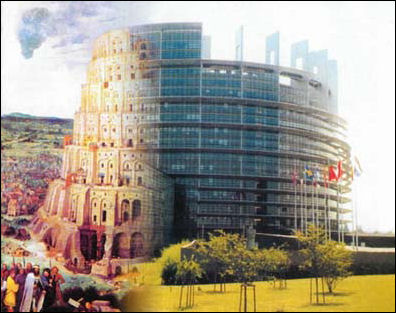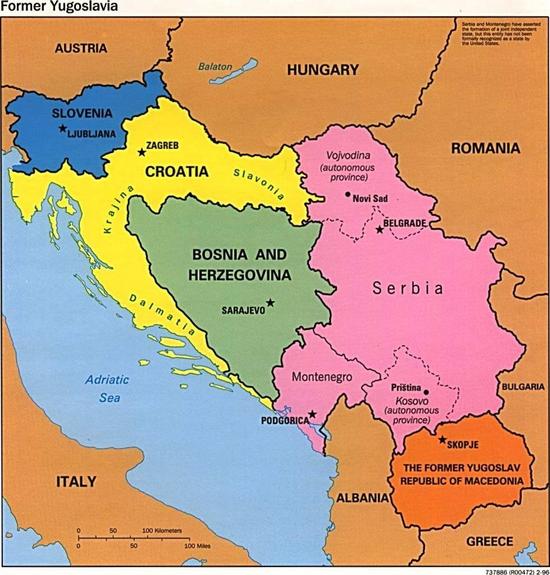
Serbia’s application to join the EU was finally made before X-mas. Early December EU foreign ministers agreed to unblock Serbia’s interim trade agreement, which is part of Stabilisation and Association Agreement (SAA). Serbia, Macedonia, and Montenegro have been approved by EU for visa-free travel within the EU Schengen area from January 2010. (More in my article “EU’s visa-freedom dividing Balkans”).
While Serbia’s pro-western government is committed to achieve EU membership same time in Serbia however anti-European feeling is growing and according some long time polls the number of those against cooperation with ICTY (Hague Tribunal) is on the rise again.
EU-Serbia trade has been growing rapidly since 2000 and now the EU is Serbia’s main trading partner. In 2007 exports and imports of goods and services to and from the EU increased to 56% of the country’s total exports and 54% of its total imports, compared with 53% and 49% in 2006. However during 2009 the economical activity between Serbia and Russia has developed significantly and the prospects are even better mainly due the starting implementation of South Stream and other projects related to it.
After visa-liberalization and the free-trade agreements one could ask what is the added value for Serbia (as well for Bosnia-Herzegovina and Montenegro too) to be a EU member state?
Next steps
Sending the application is the easy part of process, the real work for next 4-10 years is only beginning. The application will be placed on the agenda of the EU Council of Ministers. If it gets the approval of the ministers of all 27 EU member states, it will be forwarded to the European Commission, which will then send Serbia a questionnaire with 1000-4500 questions. dealing with all institutions and sectors. Based on the answers, the European Commission will report on the situation in the country which has applied. And then are starting negotiations where some 80.000 pages of EU regulations are applied to candidate country’s legislation.

During negotiations EU will open different chapters related e.g. trade, energy, internal affairs, food safety, citizen rights etc; EU also can stop opening chapters because of whatever political reasons. This kind of issues can be e.g. cooperation with Hague and Kosovo question.
And the neighbours
Croatia in 2009, with the country now entering its final phase of negotiations. In addition to agreeing on a financial package (see first story), the Council decided to set up a working group to draft an accession treaty. In relation to the former Yugoslav Republic of Macedonia, the Council noted the Commission’s recommendation to begin negotiations and agreed to return to the issue under the Spanish Presidency. Ministers were “encouraged” by recent positive developments between Skopje and Athens on the dispute over the use of the name “Macedonia”.
Montenegro presented the completed questionnaire to Commission on early December. Based on the Commission’s Opinion the Council will have to decide whether the country is ready to be granted candidate status or open membership negotiations. Montenegro applied to join the EU in December 2008 and the Council formally asked the Commission to prepare an opinion on the application four months later.
On 16 December it was Albania’s turn to receive a pre-accession questionnaire.
On Bosnia and Herzegovina, the Council reiterated its position that membership negotiations could not begin until the Office of the High Representative has been closed and replaced with a reinforced EU presence. It called on the country to “urgently speed up key reforms” and stressed the need for “a shared vision of the common future of the country by its leadership, and the political will to meet European integration requirements”.
EC can be also freeze the process if there is some unfinished border dispute with candidate country. Montenegro’s way with towards EU seems clear but it is hard to believe that Serbia and EC will soon agree which are the borders of Serbia – are they including Kosovo or not? After all the refined negotiation process however the climax will be political one – EU can take new members with any criteria and lower standards like it was case with Bulgaria and Romania.

I have no doubt that both Montenegro and Serbia can and will give satisfactory answers to EC questionnaire and have good ability to fulfill (pre) conditions. Both countries have so good administrative capacity that they can match all criteria needed for membership. Serbia has already prepared a document “National Programme for Integration of Serbia into EU” (NPI) which with its 900 pages describes the integration activities of different sectors..
Serbia has demonstrated its commitment to moving closer to the EU by building up a track record in implementing the provisions of the Interim Agreement with the EU and by undertaking key reforms. On 14 October 2009 the Commission adopted its annual strategy document explaining its policy on EU enlargement.
More about EU Commission’s country conclusions in my article “West Balkans soon ready for EU – at least part of it” .
My point of view
My estimation still is that there will be some grey area between non- and full EU membership. During next few years Turkey will come an energy hub through implementation of Blue Stream pipeline from Russia and South Stream, possible implementation of Nabucco and planned import of gas from Iraq and Iran. So in energy game Turkey will have some aces; if not membership EU must offer very attractive “third way” solution for Turkey, why not do the same with some states of the Western Balkans if needed.
Serbia’s position is a bit similar due the South Stream project which is going ahead in comparison with Nabucco, even faster than in my earlier estimation few months ago. Nabucco has got more problems with energy supply sources when Azerbaijan on December decided to sell bigger share of its gas to Russia and new gas pipe from Turkmenistan to China is progressing fast.
All Balkan countries have their own development paths – some countries are going to join fast to EU (Croatia), some are going to do it later (Macedonia, Albania), some are maybe looking alliances from other directions (Serbia), Kosovo will be international protectorate also next decade; Bosnia will totter between breakup, federation/confederation, state, protectorate depending inner politics and exterior influences.
From my point of view Serbia should think if joining to EU is worth of time, money and bureaucracy it demands. Visa arrangements, free trade and some EU programs are possible also for non-members. However I think that at this moment it would be good idea to continue EU process but not because of fulfilling EU needs. The motivation should be the needs of the beneficiaries aka Serbs not EU elite in Brussels. Also from my point of view Serbia should not put all eggs in the same basket; economical cooperation with Russia and other BRIC countries can create real development on the ground instead slow development on the EU’s negotiation tables.



